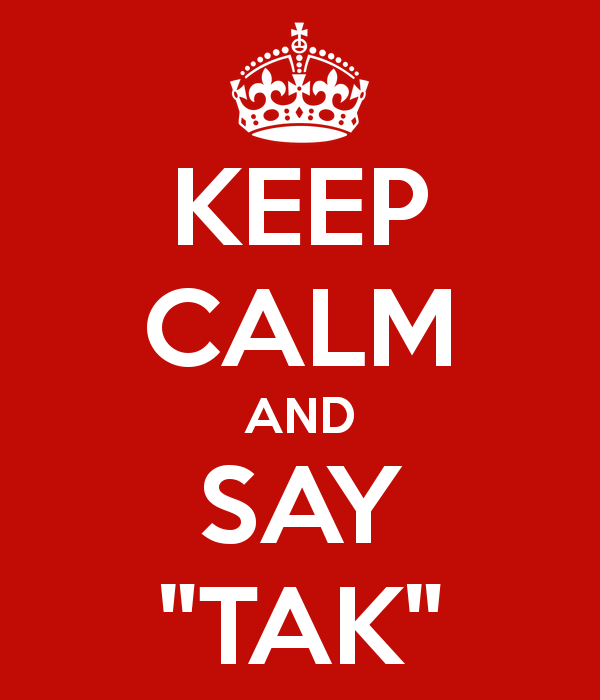The Danes are a very polite people. Even if it may initially seem like they are a bit reserved, there are in fact a lot of little rules around politeness. As a foreigner, these can be difficult to navigate. Especially the protocol around thanking people can seem a bit excessive, but it is recommendable that you learn your way around it as an expat - you don’t want to come across as rude! So here’s my little guide to the different things you should thank people for, and how to do it in Danish!
The general rule is that it is pretty much impossible to say “thank you” too many times. Danes LOVE to say it and they will be thanking you left, right and center, so you are free to thank them back for anything you please!
Tak / Mange tak / Tusind tak - “Thank you / Thank you very much.” This is the standard version. Your coffee guy hands you your latte, the cashier hands you your change, or your colleague drops off a copy of that report at your desk.
Selv tak - Now, technically, this means “you’re welcome”, but I like that it makes it so you’re thanking the other person back. See what I mean - even if someone is thanking them, the Danes can’t help themselves and must say thank you, too!
Tak for mad - “Thank you for the food”. You say this after eating a meal to thank the chef or host/ hostess. The protocol also states that they reply by “velbekomme”. Now, “velbekomme” is a bit tricky. It can either be said at the beginning of the meal (“enjoy!”) or at the end, where I take it to mean something along the lines of, “I hope you enjoyed it”. More generally, “velbekomme” is also used to express “you’re welcome”.
Tak for invitationen - “Thanks for the invite”. You can say this either when arriving or leaving (or both times, for the pros!).
Tak fordi du kom - “Thank you for coming”. You say this when your guests are arriving, or leaving (or both times, for the pros again).
Tak for sidst/ sidste gang - This is another interesting one, as I find it very typical for Denmark, and haven’t really seen it in any other language. It translates to “Thanks for last time”. You basically say this when you see someone again after hanging out before. Pros add “det var hyggeligt” (it was cozy/ great).
Tak for i dag/ i aften - “Thank you for today/ tonight.” This one is also quite typical. You can hear this used both after private arrangements - use for example when you’ve been invited over to a friend’s house - and in professional context - for example after a university lecture or a meeting. It can be said by both sides (host and guest, or professor and student).
American expat Becky lists another one in her blog for Expat in Denmark: Tak for hilsen - “Thank you for the greetings”. The basic idea here is that Danes love to have people say hi to someone from them, and the so greeted will then want to thank both you for passing the greeting and, of course, the original greeter, next time they see them. I haven’t actually heard this sentence used, but I can relate to the seemingly never-ending “pass my best to…/ say hi to … from me” and the thanks when you do. What am I, a carrier pigeon? I’m kidding, I think it’s actually quite sweet.
You can image that this whole thanking business would get quite time-consuming if, let’s say, you are invited to your friend’s house for dinner. Now you have to thank them for the invite, for last time you saw them, and for the greetings, if they passed any to you. And don’t forget to also thank them for the food and for the lovely evening when you leave!
Finally, “tak” can also be used to express the meaning of “please”, which otherwise doesn’t exist in Danish, for example when ordering something (“en kop kaffe, tak”).
In the spirit of this post, thank you for reading, and thank you in advance for your great comments!


